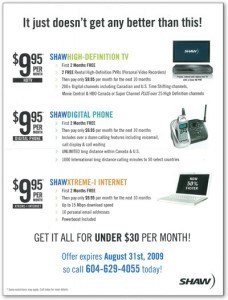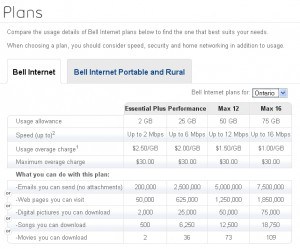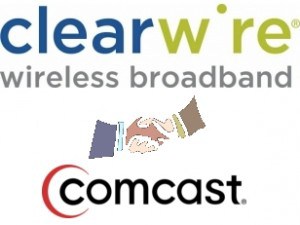
Letting Shaw get away with this will let them buy up competitors like Novus for a pocket full of Toonies.
[Update 10:16am EDT 7/29] — Brion, one of our loyal readers, had a chance to visit Novus’ website and discovered that Novus has usage allowances on its own broadband service. That’s naughty. They are far more generous than Shaw’s, which start at 10GB and are more commonly in the 60GB range for average customers, but that’s besides the point. The Comments section is where the discussion about the usage allowances are taking place. We call on Novus to explain their limit policy, and more importantly, consider dropping it altogether and using that as a competitive tool against Shaw, which has far lower limits. If the vast majority of customers are unlikely to hit them, why have them at all? Write an Acceptable Use Policy that allows for informal communication with the extreme users consuming terabytes of bandwidth a month and offers them a commercial plan for them to consider. Don’t be a part of the Internet Overcharging crowd. We celebrate the kind of competition Novus can provide residents of Vancouver and Burnaby, but we’d like to make sure the competition is worth fighting for.
[Update 6:12pm EDT] — Welcome to Novus customers who discovered this site through Novus’ campaign website. Stop the Cap! is an all-consumer website designed to promote and defend the competitive broadband marketplace in both the United States and Canada. Paul-Andre Dechêne is our Canadian editor. We are unalterably opposed to Internet Overcharging schemes, which include bit/usage caps, consumption-based pricing, and fees or penalties imposed by providers for exceeding them. We are pro-competition, pro-Net Neutrality, and opposed to throttles. Companies like Novus which provide needed competition in the cable television, telephone, and broadband marketplace are essential for a healthy marketplace with rational pricing. Shaw’s obvious predatory pricing tactics are designed to drive away Novus’ customers, making the company ripe for takeover, by Shaw of course, for a pocketful of Toonies. While those Shaw prices sound good today, driving away competition guarantees much, much higher pricing tomorrow in a monopoly environment. Novus is installing fiber optic-based service, which means they are already kilometers ahead of Bell and the usual assortment of the Shaw/Rogers/Vidéotron old school cable companies.
We welcome your views. Just leave your public comments in the editor box at the bottom of the page (or click the comments link just below the headline). You can explore more than 400 articles on our issues from the menu bar at the top. Drop down menus will let you read about the issues that are most relevant to you. Thanks for joining us. The fight for affordable broadband continues across Canada, and we welcome your participation. Bookmark us and drop by regularly. — Phillip M. Dampier, Editor]
Imagine paying $9.95 a month for a digital cable package with two free high-definition set-top boxes with personal video recorders, more than 200 digital channels, more than 25 high-definition channels, and a movie channel package. Not convinced? How about also getting two free months thrown in.
Need telephone service? How about free nationwide/U.S. calling, free installation, and a whole mess of phone features for $9.95 a month? Don’t forget broadband. That’s just $9.95 a month as well for 15Mbps service with free Powerboost. To sweeten the deal to diabetic coma proportions, Shaw will throw in two free months of service for each of those packages, too.
What’s the catch? You have to live in an area currently served by Novus Entertainment, Inc., an upstart independent fiber-based competitor wiring metro Vancouver, British Columbia. Novus has aggressively wired high rise condominiums and other densely populated neighborhoods and buildings in Vancouver. Novus is a tiny company compared to Canada’s national cable companies. Shaw provides cable television service to 2.1 million customers in several Canadian provinces. Novus has 9,000 subscribers in 220 buildings in Downtown Vancouver and Burnaby and is planning an expansion into Richmond. Those buildings are being peppered with marketing from Shaw, including this special pricing offer.
Existing Shaw customers, and those who live outside of Novus’ service area, cannot obtain the special pricing. That is the heart of a complaint lodged by Novus against Shaw at the Competition Bureau of Canada and in the British Columbia Supreme Court, charging Shaw is engaged in predatory pricing designed to put Novus out of business.
“Shaw is abusing its dominant position in the market by offering services – which it normally makes nearly 50 per cent margins on – at a sizeable loss as a means to destroy a local competitor,” said Donna Robertson, Co-President and Chief Legal Officer of Novus Entertainment Inc. “The millions of existing Shaw customers paying full price should be outraged because they’re unwittingly subsidizing the costs that customers with a competitive alternate pay, which is unethical and unfair. If they don’t make the offer available to everyone, current customers should call Shaw and demand the same deal.”
Novus points out Shaw has been “on a buying spree” picking up smaller cable operators and independent providers, but has “been unsuccessful in getting traction with Novus,” company officials suggest.
Stop the Cap! has discovered Shaw’s discount offer is a remarkable one, compared with the regular pricing Shaw customers pay elsewhere:
Shaw Deal for Novus Cable TV Customers
$9.95 digital cable with two personal video recorders, movie channel package, digital channel package
Two free months service
Shaw Deal for Other Canadians
$67.85 HD package
$16.00 Movie Central/HBO or Super Channel premium movie network
$26.95 digital cable “specialty channel” package
$ 3.95 time shifting option
$30.00 Shaw HD personal video recorder set-top box
The grand total: $144.75 per month, with no free months.
“Shaw enjoys increasing cable margins of nearly 50 per cent, which it boasts to investors is ‘best-in-class’ compared to other North American cable companies,” said Robertson. “We believe that Shaw’s targeted campaign is an attempt to eliminate Novus from the competition, which would allow Shaw to maintain its near monopoly status and raise prices for all customers whenever it sees fit”
“Based on Shaw’s actions, we can only assume that they are trying to buy our customers by gouging their own prices,” said Robertson. “They’re offering these services at an enormous loss, while forcing the rest of their customers to make up the difference. We aren’t big enough to compete with Shaw’s predatory pricing, but we are faster and more reliable, and our service is actually less expensive over the long term.”
Novus has launched a website and is busy on Twitter asking Shaw customers across Canada to demand the same special offer they are making available in Novus’ service area.
<
p style=”text-align: center;”>
Do you want the 10 Bucks Offer too? Sign our Petition and call Shaw to request this special rate.
Greater Vancouver – 604-629-8888
Kelowna – 250-762-4433
Prince George – 250-562-1345
Fort St John – 250-785-3039
Victoria – 250-475-5655
Edmonton – 780-490-3555
Calgary – 403-716-6000


 Subscribe
Subscribe





